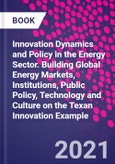Innovation Dynamics and Policy in the Energy Sector discusses the process and future of global innovation in the energy sector based on the innovation leadership example of Texas. The book proposes that the positive dynamics of Texas energy sector innovations arises from a confluence of factors, including supportive institutions, the management of technological change, competitive markets, astute public policy, intraindustrial collaboration, a cultural focus on change and risk-taking, and natural resource abundance. Heavily case-study focused chapters review the fundamental drivers of innovation, from key discoveries at Spindletop; the proliferation of oil production through major field development; through electric sector deregulation; and recent innovation in hydraulic fracking, renewable integration, and carbon capture. The work closes to argue that sustainable global innovation addressing the twin challenges of climate change and the energy transition must be driven by the promotion of competition and risk-taking which continually promotes the development of ideas, a process jointly funded by the public and private sectors and supported by collaborative and competitive institutions.
Please Note: This is an On Demand product, delivery may take up to 11 working days after payment has been received.
Table of Contents
PrefaceAddendum1. The dynamics of innovation and technology in a market economy2. The common international energy innovation drivers3. A game change at Spindletop4. From chaos to order in the East Texas Field5. Concessions abroad and the disciplined rule of capture6. West Texas and the Permian Basin early innovations7. Panhandle Field and natural gas flaring8. Upheaval in the energy markets: the Arab Oil Embargo9. Electric industry deregulation and competitive markets10. Hydraulic fracturing: the Permian Basin challenges Organization11. The oil and gas state adds renewable wind and solar12. Capture and global warming: the technology and regulation debate13. The road ahead: ideas are keyA recommendationAppendix A: The principle components of the energy systemAppendix B: Overview of energy market and regulatory structures and US influence abroadAppendix C: Recent developments in energy technology and markets







